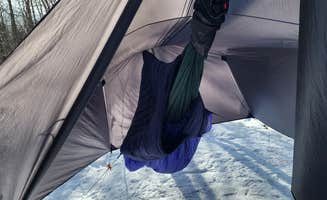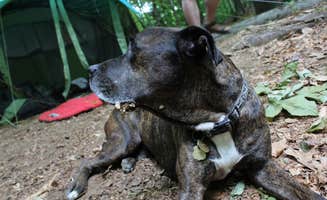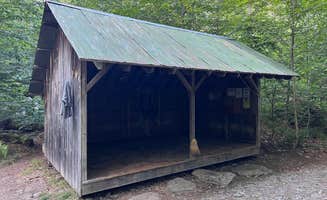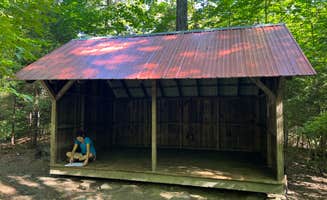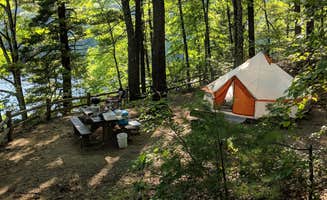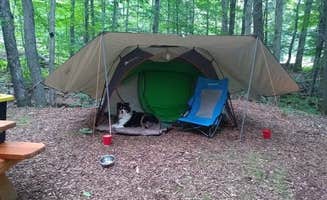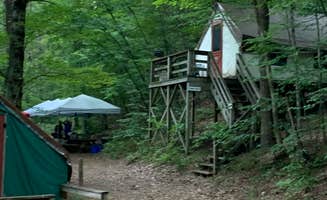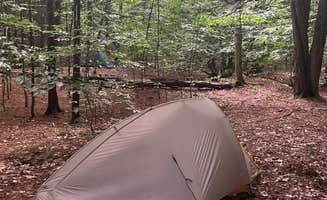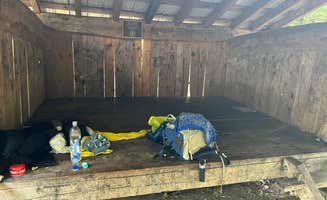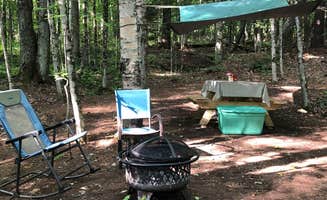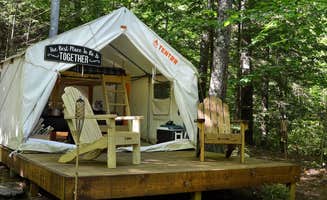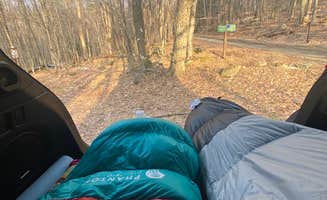Backcountry camping around Grafton, Vermont offers hikers access to sections of the Appalachian Trail and Long Trail through the Green Mountains at elevations ranging from 1,000 to 3,000 feet. Water sources vary seasonally with numerous streams and ponds accessible from trail shelters. Summer temperatures typically range from 50°F at night to 80°F during daytime, while spring camping often means navigating muddy trail conditions as snow melts.
What to do
Swimming at natural ponds: Michigan Brook offers tent camping spots near water, though visitors should practice proper waste disposal. According to one visitor at Stratton Pond Shelter, the lake "is one of the largest bodies of water on the Long Trail" and provides a refreshing destination after hiking the 3.75-mile trail from the nearest parking lot.
Hiking to waterfalls: Just 15 minutes from some camping areas, Doane's Falls features a series of five waterfalls along an ascending wooded path. A camper at Tully Lake Recreation Area notes the falls are "beautiful, and it's not unusual to spot professional nature photographers at various points along the waterfalls."
Canoeing and kayaking: Several campgrounds offer boat rentals for exploring local waterways. At Tully Lake, campers can "either paddle or walk into your site" with waterfront access at select campsites, making it convenient to explore the lake during your stay.
What campers like
Rustic camping with modern amenities: Campers appreciate the balance between wilderness experience and basic comforts. A visitor to Maple Ridge Farm mentioned, "They have a common room that has games and eggs for sale. Toilet and shower were very clean. Very lush campground, plenty of space and privacy between sites."
Peaceful tent platforms: Many backcountry sites feature level wooden platforms that keep tents dry during wet weather. At Stony Brook Backcountry Shelter, a hiker noted "there were a few large tent areas where multiple tents could fit and which looked quite level" making it suitable for small groups.
Vehicle-free camping: The absence of cars creates a quieter experience. A camper at Tully Lake praised this feature: "No cars at all at the campsites, which was great for peace of mind as our toddler roamed around. It also made for a super quiet stay."
What you should know
Water treatment required: Most backcountry sites have no treated drinking water. At Stony Brook, "there was no water on the shelter, but there was plenty of water at Stony Brook / Mink Brook a bit further northbound" where hikers can filter or treat water from natural sources.
Fire restrictions: Rules vary by location with several shelters prohibiting open fires. At Winturri Backcountry Shelter, fires are not allowed, but the shelter offers compensation through its size and can "fit maybe 6-8 folks" with "lots of tent camping spots as you worked up the hill perpendicular to the shelter."
Limited cell service: Most camping areas have poor or no cellular coverage. Tully Lake campers note "cell coverage is pretty close to absent or poor in most of the area, so download any maps you might want (driving, trail, geocaching) before you arrive."
Site reservations: Popular campgrounds fill quickly, especially for summer weekends. For Tully Lake, "sites fill up weeks out (and can completely fill the day registration opens, which is date-dependent each year)" requiring advance planning.
Tips for camping with families
Pack light for walk-in sites: Many tent camping areas near Grafton require walking from parking areas to campsites. A visitor to Zoar Outdoor noted the campground is "connected to an adventure/outing company that provides white water rafting, tubing and other water activities on a nearby river," making it worth the extra effort to reach tent sites.
Choose sites near facilities: For families with young children, select campsites closer to restrooms. At Barton Cove, staff help match needs to sites: "The office was super helpful when I called to make reservations, making sure to ask questions about how big my tent was, what kind of view/privacy we wanted etc so they could help me find the perfect campsite."
Consider group shelters: For family reunions or larger gatherings, some areas offer designated group sites. At Stratton Pond Shelter, facilities include "2 tent platforms, 2 outhouses and at least 16 bunk spaces in the shelter," accommodating various sleeping preferences within a single group.
Tips from RVers
Stick to established campgrounds: Most backcountry sites near Grafton are tent-only with no RV access. For RVers, look for campgrounds with walk-in tent sites while parking your vehicle in designated areas. While most local sites don't accommodate RVs, tent camping opportunities abound for those willing to hike in from parking areas.


